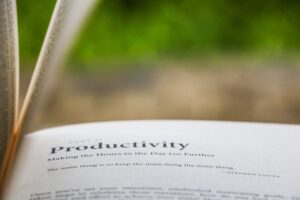8 min read

“From Seed to Success” – DALL-E
Introduction
This guide will be on how you can do less work, or work less hours, yet still achieve the same output or result that you normally work for, or even better.
The common misconception is that you need to invest as much time as possible to get the best possible results. However, in today’s day and age, that couldn’t be farther from the truth. The reality is that in order to maximize your results, you need to learn how to use your time better and smarter, so that the results you yield are in your favor.
My Story (How I did it)
It was my freshman year of high school. I had worked so hard the entire year (the past 7 or so months; it was currently March or April) that I honestly forgot how to enjoy myself, and make use of the time for myself because I was so invested in school, so invested in doing as best as I could so that -some day- I could go to a great college, make my parents proud, and not feel like a loser that had disappointed his bloodline.
Sounds harsh. Right. That’s because everyone around me was. In my household (even to this day), grades are recognized as the key to success, college as the only way to a good future, and a consistent grind to get the job that I want to be the only way to afford a house, a car, and a family.
If you believe any of the things that I just uttered, I suggest that you click off this post and do a little bit of research. Stop anything you’re doing, and please do this. Just this. In a few years, you might thank me. As a starter, just google (or watch a few youtube videos) on college, its impact on finding a job, and mastering your portfolio. Off topic, but some day I wish to make posts in regards to these topics specifically, so if you’re lucky, we might already have posts on GG with respect to everything already mentioned.
Fast-Forward
Past March, by the time it was April, I suddenly found myself gradually getting lazier. I was more involved in groups, hangouts, friend chats, and was more connected with my friends and who I spent 7 hours a day with, every day.
My point is, I got lazier. And as a result, I found myself in a position where I had to do something different to prevent my grades from dropping like mad, but not do so much that I would have to work any harder.
What Happened
Prior to this, I had invested all my effort on every single task. Even if it was easy, and isn’t worth any sacrifice, I still went to the moon and beyond for that said task. Whatever task it was, I made sure that nobody in my class could outscore me (just to put it into picture). As you can imagine, after a while, that gets really tiring.
So, I said ‘screw it’. By the month of April, I studied less, put barely any effort into the lesser significant assignments, and only focused my attention on the deadlines that mattered – big assignments (those worth a bunch of points), projects, and tests (not quizzes; I went easy on those too).
From that day on, for a lot of my quizzes and tests, I just slowly started to care less and less. Yet, what I found was that I magically, somehow, did better than I ever had. My laziness yielded me greater results. Somehow, some way, I was able to find the magical secret (a secret that no one, ever, had ever told me of) to getting good grades without losing your mind over it.
The night before any quiz or test, I pulled out my phone, and binged several youtube videos, read community forums, online comments, any source of valuable information, and just consumed that content until my brain was at capacity.
What I Did
Most people tell you that information stored in your long-term memory is information that takes ages to leave your brain. It’s essentially hard-coded, and imprinted on your brain for such an extended period of time that it doesn’t leave weeks after reviewing.
Most people tell you to target this form of stored memory information. They tell you that in order to do well on any exam, you need to prioritize storing information in the long-term side of your brain, the side that won’t ever leave that specific piece of information, ever.
However, if I could tell you how much of a lie that is, I would – but I can’t, because this article would go far past what I’m willing to write. So, I’ll put it like this: why would you study weeks or days in advance when you know that this piece of information is only necessary for one day, one exam, and a few questions? Why would you even bother?
Say that you have a 20-question quiz that’s coming soon (in 3 days, for say). My original approach would be to start studying as soon as I’m advised that there’s a quiz upcoming, and ensure that I’m inputting as much quality effort as possible (was never really high-quality, though) into studying. That way, I got the score I wanted, guaranteed. Yeah, I ended up learning that more studying does not equate to a higher score. And the hard way too.
What I did learn however was that with my new approach, I could successfully store all the information I needed (enough to blurb on it, answer free-response questions with ease, and write about any details regarding the concept at all) in my short-term memory, and use that stored information on the day of the test. Easy.

“Enlightened Mind” – DALL-E
Short-Term Memory (How You Can Do It Too)
To succeed in the same fashion that I did, you need to apply the same central principle. Your goal is to cram as much information as possible into your brain, and successfully use that stored information on test day.
Specific Sources of Learning
Any of the following methods of consuming educational content work perfectly. Just use any of the following and you should be able to successfully store information at ease:
- YouTube Videos
- Google Articles
- Google Search
- Online Forums
- Community & Comment Sections
- PDF Files
- + any other internet and cost-free sources
Please Read: This method only worked for me because I learned how to master the way my mind learned. I learned how to enter the flow state (a state of focus in which concentration is completely maximized), and because I learned how to make learning fun for my brain to do.
What I did, and how I did it is something that I still honestly don’t know how I made possible. Even to this day, I still don’t know exactly how I did it – how I was able to enjoy learning things that I used to hate, fun; or how I used to get exceptionally high grades (we’re talking above 95% regularly) while trying significantly less compared to my prior self that worked like anything you’d imagine for a teenager to get above 90, 92, or 95%.
If I knew the genuine psychology behind my brain and its internal functionality that allowed me to do what I was able to do – trust me, I’d probably be a lot more known than I already am.
How You Can Apply My Lessons
Learn how your brain learns. Find the optimal way that your brain is able to consume and absorb information. This is the method that you’ll use to do the job.
Know that to do this, you need to be comfortable with learning at a rapid rate. If you’re unable of studying and working under pressure, I do not recommend this method. Continue by finding a reliable source of information, or googling reliable sources for the necessary information, and proceed by consuming as much content as possible. Force feed your mind, and find critical points that stands out in X lesson compared to Y lesson previously taught by your teacher in the same, or a different class.
Apply the lesson (if possible) to real-world applications. What do alpha particles have to do with our advancement in current-day machine and science-based concepts; anything at all?
Continue for whatever time you have left (ideally an hour is enough to do the job), and walk up to the test, and be confident – unless you don’t remember anything at all; or very little. In which chase, you’re screwed.

“The Enchanted Levitation” – DALL-E
You Need To Work Hard Before Working Smart
I saw a quote from a popular multi-millionaire entrepreneur by the name of Alex Hormozi who said something along the lines of “in order to work smart, you need to work hard.”
At first, it honestly confused me. Why can’t I just apply what other people know, and get the results that they said I’d get?
Well, it’s actually pretty simple. You have absolutely no clue what I did. You have zero similar experience with what I did. In order to get the grades you believe that you deserve, you need to work for it, obsess over it, and then apply the applicable leverage to it.
When I was a sophomore, and AI technologies and advancements started popping up left and right, my friends decided that it’d be a good idea to just use these technologies to all of their work for them, cheat on their tests, on their quizzes, bs their project assignments entirely, and fake all of their supposed “effort”.
You wanna know how they did? They had terrible grades. We’re talking Ds, Cs, and Bs – all while “working smart”.
Truth is, you NEED to work hard, and understand what the definition of “hard work” is before you even think about working smart. You need to know what it feels like to do the task hundreds of times, over and over, until there is only one correct encoded way for you to complete X task. If you don’t understand this, you will fail to get the grades you want. You will never reach that point, ever.
Please Avoid The Common Mistake
Always, always work hard before working smart. Before technology can do you work for you, you need to learn how to do work for technology. Earn it. Leverage is powerful when you know how to maximize it, and when you perfected the surface and conditions that it works under.
By the time you’ve applied this advice, mastered the way you learn, and the quality of your work and what it should be, you can get to building your leverage-based system.
DISCLAIMER: THIS DOES NOT EXCEED A CERTAIN DIFFICULTY
Past a certain difficultly of exams, AP exams are a great example, this advice does not apply. Please do not try it, because chances are that it won’t work out in your favor. ONLY, and ONLY if you are heavily comfortable and familiar with the information that you’re reviewing should you ever follow this method. (at a level that you’ve completely mastered it)
Conclusion
You should be able to comfortably work under pressure, work under terrible conditions, and work even when your mind objects against it. That’s the sign that you’re doing things right. It sucks, but it won’t in a few months from now. You just need to be patient.



